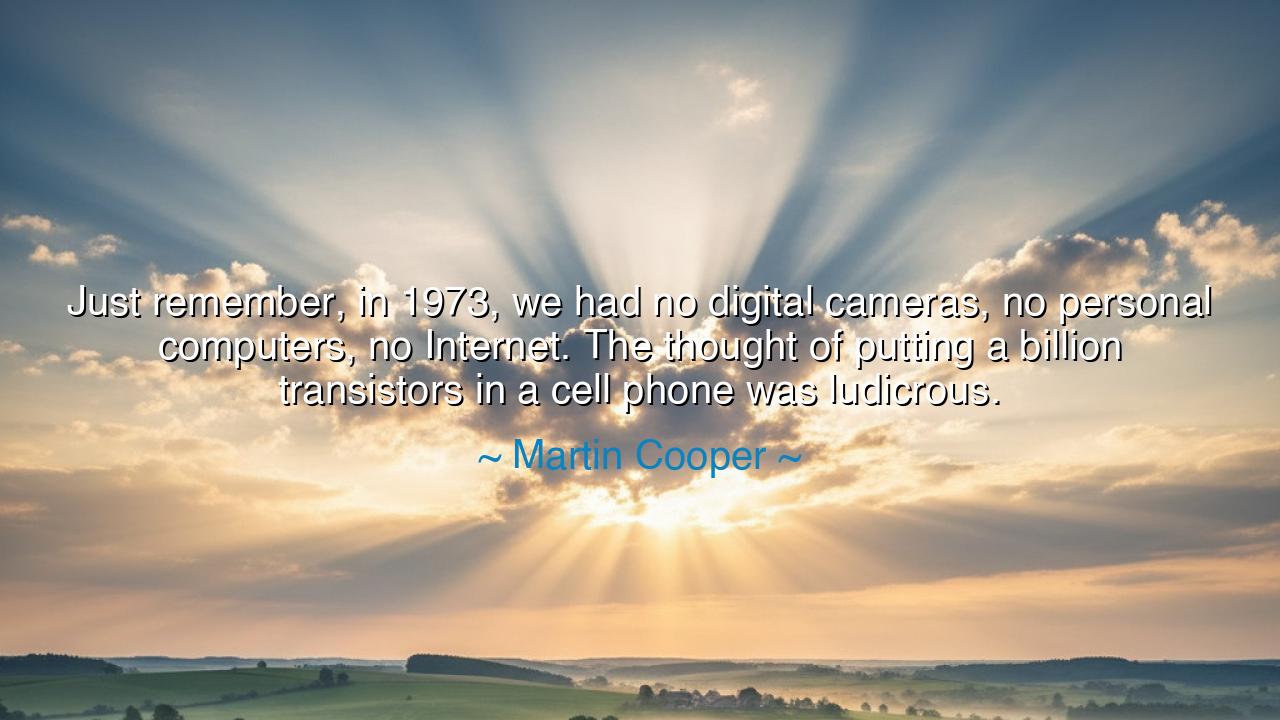
Just remember, in 1973, we had no digital cameras, no personal
Just remember, in 1973, we had no digital cameras, no personal computers, no Internet. The thought of putting a billion transistors in a cell phone was ludicrous.






“Just remember, in 1973, we had no digital cameras, no personal computers, no Internet. The thought of putting a billion transistors in a cell phone was ludicrous.” – Martin Cooper
In these words, Martin Cooper, the father of the cell phone, speaks as a man who has witnessed the unfolding of miracles. His voice is that of one who remembers the humble beginnings of a revolution that changed the face of humanity. He calls us to remember, not to indulge in nostalgia, but to awaken gratitude—for progress so vast that what once seemed ludicrous has become everyday reality. Cooper’s statement is not merely about machines; it is about the human spirit—its capacity to imagine, to endure, and to create the impossible.
In the year 1973, the world was still anchored in simplicity. The digital camera did not yet capture light into eternal memory. The personal computer had not yet found its way into every home. The Internet, that vast sea of minds, was only a dream resting in the minds of visionaries. And yet, in that same year, Martin Cooper stood on a street in New York City, holding a prototype that would change everything: the first mobile phone. It was heavy, crude, and clumsy by today’s standards, but it was alive—a whisper from the future in the palm of his hand. When he first made that call, he was not just speaking across a distance of blocks; he was speaking across the gulf of centuries, heralding the dawn of a new age.
His reflection on that time reveals a profound truth: every great innovation begins as a dream mocked by the practical mind. When he says, “The thought of putting a billion transistors in a cell phone was ludicrous,” he reminds us how progress often looks absurd to those who have not yet caught sight of the horizon. The ancients once believed that flight was the domain of gods; today, steel birds cross the sky. Once, the moon was a symbol of distance; now it bears the footprints of mankind. What is ludicrous in one generation becomes ordinary in the next—if only there are souls bold enough to chase the impossible.
Consider the story of Leonardo da Vinci, the artist-engineer of the Renaissance. In his notebooks, he drew sketches of flying machines and mechanical men—visions that his world could not yet build. To his peers, such dreams were madness. But Leonardo did not draw for his time; he drew for ours. Just as Cooper’s bulky mobile phone foretold the sleek devices that would later fit in every pocket, Leonardo’s drawings whispered to a future that would one day soar. So too, Cooper’s words teach that progress does not come from those who laugh at the dream, but from those who dare to believe it possible.
And yet, there is humility in Cooper’s remembrance. When he speaks of a world “with no digital cameras, no personal computers, no Internet,” he reminds us how swiftly wonder fades into entitlement. What was once the marvel of the few has become the expectation of the many. We scroll through worlds of information without gratitude, forgetting that not long ago, even the simplest connection was a triumph of human genius. In his reflection, Cooper invites us to honor the journey, to look not only at what we hold, but at the centuries of effort that placed it there.
There is, too, a warning hidden in his wisdom: never believe that progress has reached its end. The same disbelief that once called a billion transistors “ludicrous” still whispers in our ears today. We hear it when we speak of curing incurable diseases, of reaching distant planets, of merging mind and machine. Yet, if history has taught anything, it is this: the limits of today are only the stepping stones of tomorrow. The visionaries of every age are mocked before they are praised, resisted before they are revered.
Thus, the lesson of Martin Cooper’s words is not only about technology—it is about faith in human potential. Let every person remember that the inventions of tomorrow are waiting within the imaginations of today. Do not be afraid of ideas that sound foolish; nurture them. Do not be content with comfort; strive toward the next frontier. For the world that once found a billion transistors in a cell phone impossible is the same world that now holds infinity in its hands.
So, to those who dream, let this be your call: believe boldly, create fearlessly, and remember humbly. What seems ridiculous now may one day reshape the earth. Just as Cooper once stood with a phone that carried the voice of the future, so too may you stand with your own creation, laughed at by many but destined to change the course of humanity. For progress is not born from certainty—it is born from the courage to imagine what others cannot yet see.






AAdministratorAdministrator
Welcome, honored guests. Please leave a comment, we will respond soon